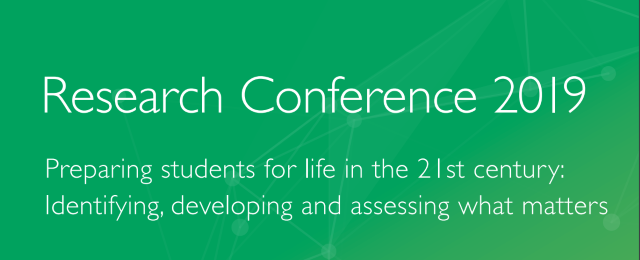
Monday 5 August 2019
Start Date
5-8-2019 11:30 AM
End Date
5-8-2019 12:30 PM
Subjects
Digital literacy, Generic skills, Information technology, Large scale assessment, Digital technology, Technology integration, Primary secondary education
Abstract
Digital literacy, under a wide variety of names, is routinely classified as a 21st-century skill and is frequently reported as an area of high priority in school education systems internationally. In comparison with students in other countries, Australian students have high levels of access to digital technologies both at and outside of school. With this access comes the expectations that students will be highly-proficient users of digital technologies and that schools will use digital technologies in transformative ways to support student learning. This session will examine how concepts of digital literacy have developed over time, what data from large-scale assessments of student digital literacy tell us about students’ learning in this area (both in Australia and across countries) including how it has changed over time. We will also reflect on the differences between the rhetoric and the realities of digital literacy and what these mean for the future direction of this critical area of learning.
Recommended Citation
Fraillon, J. (2019, August 05). Digital literacy: Myths and realities [Paper presentation]. Research Conference 2019 - Preparing students for life in the 21st century: Identifying, developing and assessing what matters. https://research.acer.edu.au/research_conference/RC2019/5august/7
Recommended Citation (OVERRIDE)
Fraillon, Julian. (August 2019). Digital literacy: Myths and realities. In K. Cockle (Ed.), Research Conference 2019: Preparing students for life in the 21st century: Identifying, developing and assessing what matters: Proceedings and Program: 4–5 August 2019, Melbourne Convention and Exhibition Centre. (pp.68-72). Melbourne: Australian Council for Educational Research. https://research.acer.edu.au/cgi/viewcontent.cgi?article=1357&context=research_conference
Digital literacy Myths and realities presentation
Copyright Statement
Copyright Australian Council for Educational Research 2019
Place of Publication
Melbourne, Australia
Publisher
Australian Council for Educational Research (ACER)
ISBN
9781742865546
Included in
Educational Assessment, Evaluation, and Research Commons, Educational Technology Commons
Digital literacy: Myths and realities
Digital literacy, under a wide variety of names, is routinely classified as a 21st-century skill and is frequently reported as an area of high priority in school education systems internationally. In comparison with students in other countries, Australian students have high levels of access to digital technologies both at and outside of school. With this access comes the expectations that students will be highly-proficient users of digital technologies and that schools will use digital technologies in transformative ways to support student learning. This session will examine how concepts of digital literacy have developed over time, what data from large-scale assessments of student digital literacy tell us about students’ learning in this area (both in Australia and across countries) including how it has changed over time. We will also reflect on the differences between the rhetoric and the realities of digital literacy and what these mean for the future direction of this critical area of learning.

